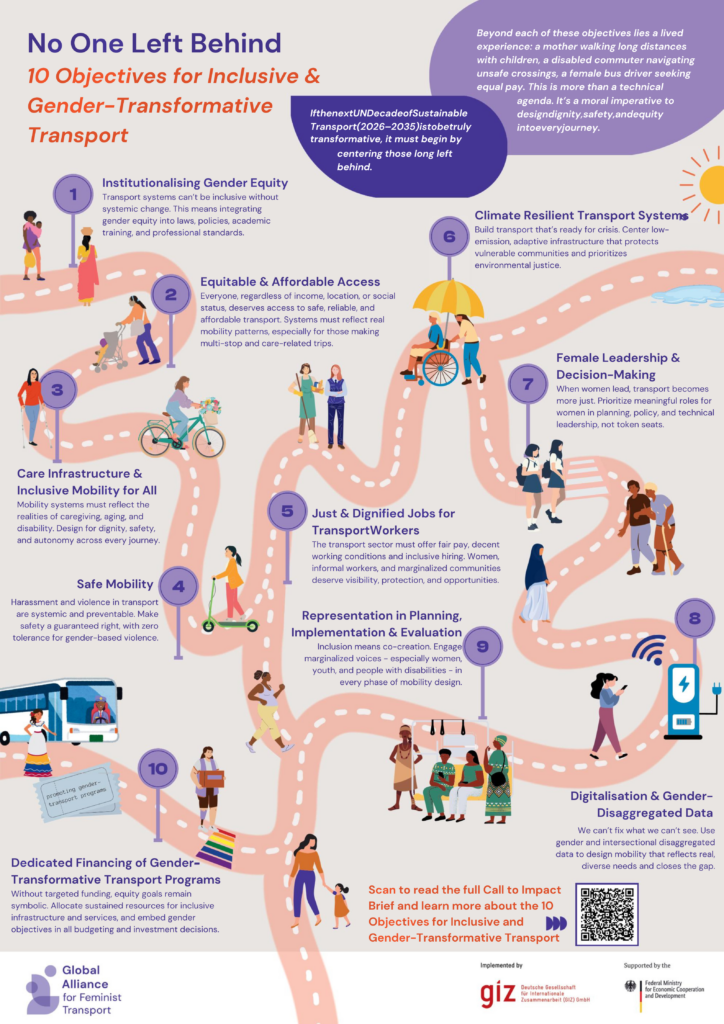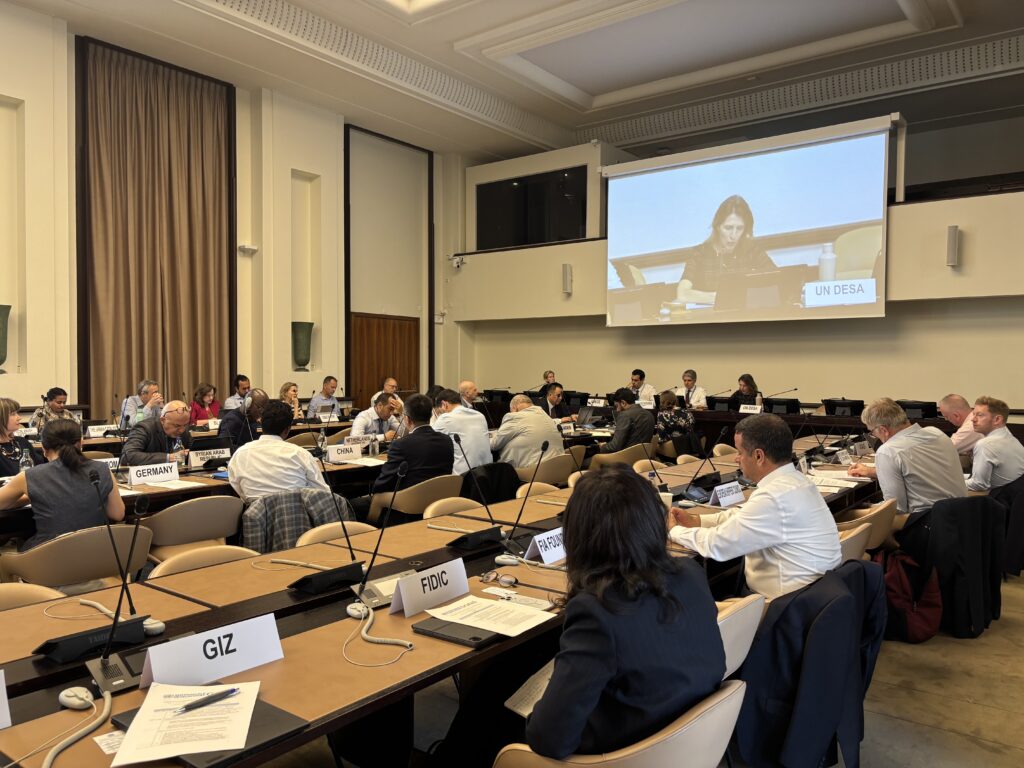
As the UN Decade of Sustainable Transport (2026–2035) approaches, global attention is turning to the future of mobility. Cleaner, safer and more efficient transport systems are essential, but that vision will fall short if it overlooks the needs of those historically excluded from planning and policymaking.
Therefore, the “No One Left Behind” Call for Impact, initiated by the Global Alliance for Feminist Transport, emphasises the need to centre gender and social equity at the core of transport planning. Presented during the UN DESA Expert Group Meeting on Sustainable Transport in June 2025, it outlines ten strategic goals to guide governments, funders and practitioners in building mobility systems that are truly inclusive.

Based on years of advocacy and evidence, the Call for Impact highlights the mismatch between mobility systems and the lived realities of many people. To resolve this mismatch the Global Alliance for Feminist Transprt addresses ten key aspects of transport planning. Among others, they demand policy makers and practitioners to ensure affordable transport for all, especially those in low-income or rural areas, and to design safer environments for women and marginalised groups. Their Call further underscores the importance of care infrastructure, and the need for gender-disaggregated data to address gaps in mobility. Transport planning must account for the complex travel patterns of caregivers, children, and the elderly, ensuring their needs are placed at the centre of the mobility systems of the future.
At the heart of the Call for Impact is the recognition that transport systems must be designed with the needs of all people in mind. It is crucial to ensure that mobility is accessible and affordable for everyone, regardless of income, geography, or social status.

The campaign is a timely intervention. While transport is increasingly recognised as a lever for climate action and development, equity remains an afterthought in many planning and funding processes. Women, caregivers and marginalised communities continue to face barriers, from unaffordable fares and unsafe environments to a lack of voice in decision-making.
The UN Decade is a fitting occasion to proactively shape the next ten years under the umbrella of the UN. We all must ensure that gender-transformative and inclusive mobility approaches are integrated. Unfortunately, the goals of the UN Decades are not legally binding – meaning it’s up to individual member states to take initiative. That poses risks, but also opportunities – at least for those who seize them!
Viviane Weinmann, Sustainable Transport Planner at TUMI and WomenMobilizeWomen Co-Lead, Interviewed in June 2025
The persistent challenges of safety, affordability and accessibility are often compounded by limited data and a lack of inclusive participation in planning processes. Yet addressing these challenges is not just about filling data gaps. It is about shifting priorities and redistributing power. Who gets to define what “sustainable” transport means? Whose needs shape investments? Who benefits from innovation?
The ‘No One Left Behind’ Call for Impact urges governments, development actors and planners to treat inclusive mobility not as a peripheral concern, but as a core condition for achieving climate goals, social justice and effective public services.
The ten objectives for inclusive and gender-transformative transport were presented as a call for action by the Global Alliance for Feminist Transport during the UN DESA Expert Group Meeting on Sustainable Transport held on 23 to 24 June 2025 in Geneva. The event brought together stakeholders from UN agencies, regional commissions, national ministries, development banks and civil society to shape the Decade’s Implementation Plan. The support of more than 40 signatory organisations reflects a growing coalition united by a common goal: making transport systems work for everyone. At its core, the “No One Left Behind” campaign underscores that mobility is not only a technical issue — it is a matter of equity, rights and voice.
TUMI is the leading global implementation initiative on sustainable mobility formed through the union of 11 prestigious partners. We are united in one goal: changing mobility for the benefit of people and the environment, with a view to the future. With TUMI, the German Federal Ministry for Economic Cooperation and Development (BMZ) is supporting climate-friendly, inclusive, safe and affordable Mobility in cities. TUMI is funded by BMZ and implemented by GIZ in collaboration with all TUMI partners.
 The Global Alliance for Feminist Transport launched the 'No One Left Behind' call for impact with at the UN DESA Expert Group Meeting on Sustainable Transport. | ©UN DESA
The Global Alliance for Feminist Transport launched the 'No One Left Behind' call for impact with at the UN DESA Expert Group Meeting on Sustainable Transport. | ©UN DESA

Cristal Stefania Cedeño Tobanda
cristal.cedenotobanda@giz.de
Visit profile